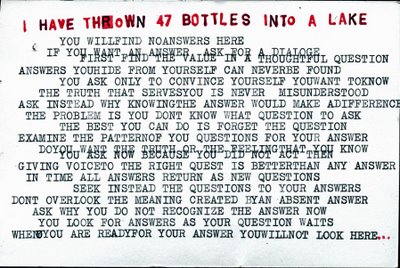Last week a group of students in my class gave a presentation about the postcard secret-sharing project called PostSecret. You can check out their website here: http://www.postsecretcommunity.com/
When I first learned about PostSecret, I thought it was just another website encouraging artistic people to send in their work and try to get it posted on the internet. However, after doing a bit more research and taking a closer look at the background story to the site, I realized that it is much more than that, and much more open to everyone. It describes itself almost like a therapy program, to help people who have been suffering from an inner problem and have not yet found a way to effectively cope with it.
In the backstory behind the start of PostSecret, the creator, Frank Warren, describes how it first started with the “reluctant oracle” project, where he artistically generated and sent out a work to be discovered and interpreted by anyone. He did it to give people advice on how to deal with anything that was bothering them, insignificant or life-changing.
Here is an example of one of his “reluctant oracles” he created:
On the last “reluctant oracle” it stated, “you will find your answers in the secrets of strangers,” and that is what started the idea of allowing people to create their own postcards and write their secrets on them, putting them out there to the public world. Now, what I find most interesting about this is that the concept of PostSecret serves two purposes. The first is to serve as a coping mechanism for the person who creates the postcard, forcing them to think deeply about how to artistically represent their secret in a unique way, which will hopefully lead to getting their postcard chosen as one of the few to be posted online. The act of even writing the secret down is, for many people, already a big step in releasing some of the pressure that has been built up inside them from the keeping in of the secret or issue. The second purpose of PostSecret, as expressed in the quote from the last “reluctant oracle” is to serve as a forum of admitted secrets that others can relate to. People find comfort in seeing that others share similar problems or sufferings—that they are not alone. By being able to relate with other people through their secrets, people saw the site as a kind of therapy.
The popularity of PostSecret has been seen by Twitter, who even started SecretTweet, a supposedly anonymous way to tweet secrets about anything you want. You can check out an article about it here: http://latimesblogs.latimes.com/jacketcopy/2009/02/like-postsecret.html
The popularity of anonymous secret-sharing can be seen by an idea from Calvert, quoted by Miller & Shepard in their scholarly article “Blogging as Social Action: A Genre Analysis of the Weblog”– that people’s relationships with each other through media can be described as “mediated voyeurism”, or “the consumption of revealing images of and information about others’ apparently revealed and unguarded lives, often yet not always for purposes of entertainment, through means of the mass media and internet” (http://blog.lib.umn.edu/blogosphere/blogging_as_social_action.html). “Mediated voyeurism” has become such an evident part of human obsessions that hundreds of new websites specifically serving this purpose has appeared. One may ask, how many secrets can be anonymously shared until the whole world knows everything about everyone?

